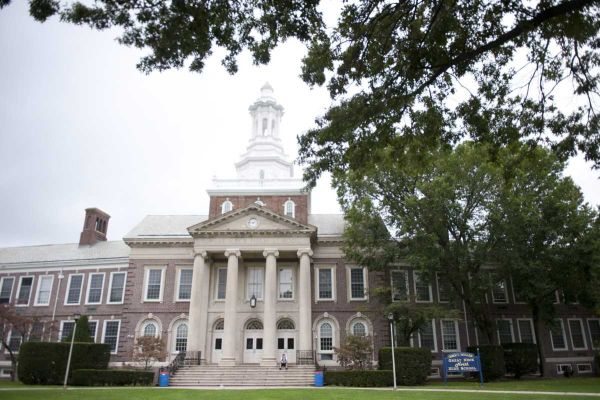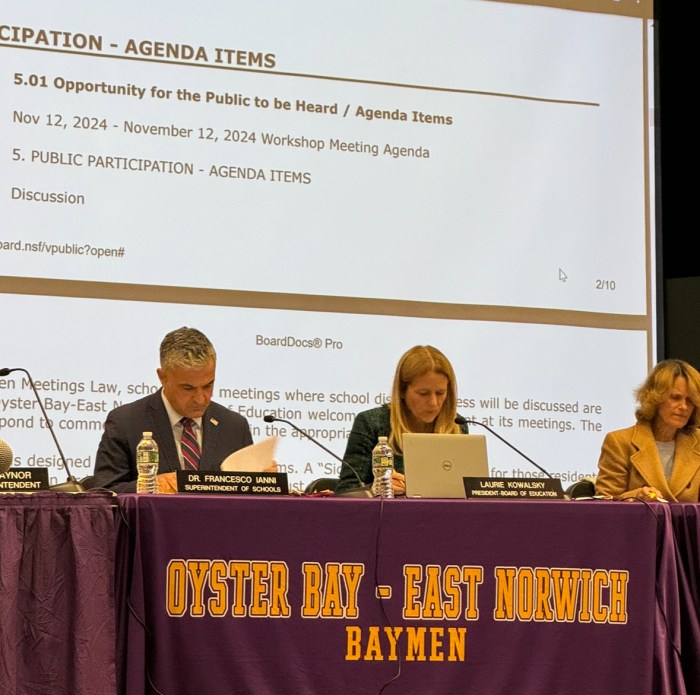The Westbury School District came under fire last year after being cited for what the Attorney General (AG)’s office said was denying or delaying enrollment for immigrant and overage students. And while the district says they have made every effort to be in compliance, some board of education trustees questioned the methodology, saying Attorney General Eric T. Schneiderman was “setting students up to fail.”
“We have the challenge of educating young people who have an interrupted education, who don’t speak the language and are aging out,” said trustee Pless Dickerson at the Jan. 12 board of education meeting. “They’re putting them in situations where they’re going to fail. There’s no skills training, there’s nothing.”
In September 2015, the AG’s office opened a formal investigation into the Westbury School District, ultimately determining that from summer 2012 to fall 2015, the district had “denied or delayed the enrollment of numerous students who sought to enroll, many of whom are unaccompanied minors originating from Central and South America, and…not U.S. citizens at the time they sought to enroll,” according to a press release on the AG’s website. The AG said the enrollment delays were caused by district requirements for proof of residency and age that “exceeded requirements set forth in state law” and oral inquires by district employees concerning the national origin of prospective students.” The AG’s report also stated that the district was encouraging overage (over 16) English Language Learners to enroll in non-credit bearing programs and not the high school program.
The district settled an agreement with the AG in February 2016, which contained several stipulations, including the hiring of an enrollment and academic placement ombudsmen. That role was filled by Dr. Catalina Castillo, who gave a presentation on her findings during last week’s board meeting.
The fear of another citation by the AG’s office has been a major concern for the district, which now has extra measures in place to make sure students up to age 21 are enrolled in classes according to the state requirements.
“One size does not fit all. These students have very unique needs.”-Dr. Catalina Castillo
And while the board of trustees noted they had every intention of being compliant, they said at some point, what the AG is posing is just not practical.
“I have a problem with the spirit behind this,” said Dickerson. “I believe in equal access, but overage students are not attending. It’s one thing to say everyone’s entitled to equal access, but to say ‘you are 20 years old and I’m going to put you in the ninth-grade because you don’t have the skills to be any higher’…what is that doing for this particular individual?”
Students are placed according to how they score on academic screenings and many times, score much lower than they should for their age range. The board pointed out it didn’t make sense for students, who would age out of the program before getting their degree, to be enrolled in classes, and leave the district without any type of vocational or career training.
Castillo said she had shared those observations, including a lack of attendance from students between the ages of 17 to 21 and yearlong registration (as opposed to other districts, where registration happens mostly in September), with top monitors at the AG’s office.
“One size does not fit all,” Castillo said. “These students have very unique needs. The district wants to do what’s right for these students but we’re afraid to do things we know are good for the kids because it’s going to appear as if we’re segregating them. But we’re not. We’re trying to meet the needs of specific targeted groups of kids.”
Castillo noted that between July and December 2016, 878 students had joined the district, with more than 200 of them enrolling at the high school. The majority were coming from outside of the United States, she said. The state also requires the district to ask for less information than they used to upon registration; that opens up a whole new can of worms, including in some instances not being able to confirm a student’s real age or if they received a high school diploma in their country of origin.
“A lot of the regulations have tied the hands of many districts. If students don’t have records to bring, if they’re unaccompanied, you cannot turn them away,” Castillo said, adding that that also applies to displaced and homeless students. “You don’t have a full picture. Many districts have continued past practices, now we’re in a situation where you’re taking students, even though they may not have all the paperwork they had before.”
Once a student is registered, the district must make sure he or she is enrolled for classes the very next day. Superintendent Dr. Mary Lagnado noted the challenge of accommodating faculty to meet the growing needs of students; Castillo said in one day alone they had 25 students register. And while the language barrier is an issue, the biggest challenge these students face is going long periods of time without receiving formal education.
“The greatest need is that we’re getting students who have an interrupted formal education,” said Castillo. “That is a lot harder to build gaps in than language. Language we’re addressing, it’s the gaps they come with that is the challenge. They need additional support.”
Trustees expressed their frustration with the high number of overage students dropping out or not attending classes, which affected the school’s overall scores.
“A number of students between the ages of 17 and 21 are forced to register to meet immigration or family court requirements,” Castillo said, adding that to keep their enrollment status, students can’t miss more than 20 days of school in a row. “Some students register to obtain proof, but show up right before the 20 day mark. We have about 45 to 48 students doing this.”
Lagnado noted that she was looking into an exemption to not include overage students into the district’s overall dropout rate, and that she, as well as administrators from the Glen Cove and Oyster Bay School Districts, recently had a conversation with Nassau Community College President Dr. W. Hubert Keen about possibly offering a program to accommodate these students. The board also noted the importance of collecting data, and bringing that information to elected officials.
“This is a problem that has to be dealt with on a state and federal level,” said trustee Karin Campbell.





























